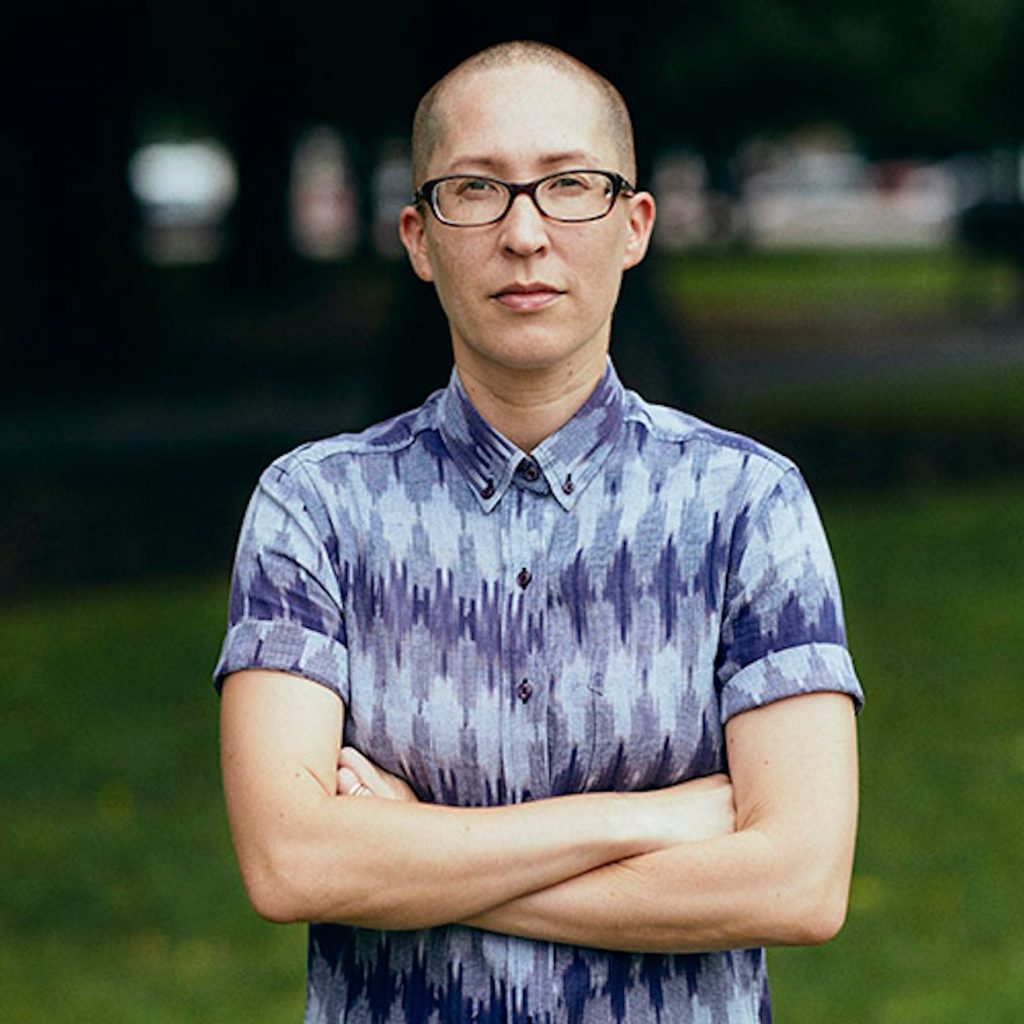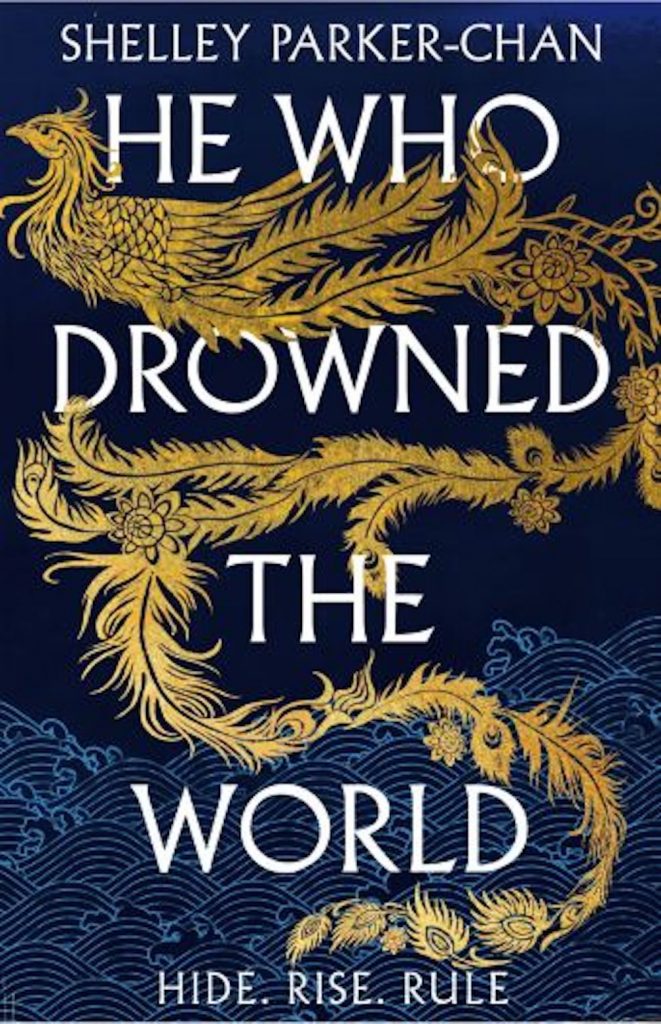Asian Australian former international development adviser who worked on human rights, gender equality and LGBTQ+ rights in Southeast Asia, Shelley Parker-Chan couldn’t find what they were looking for in existing fantasy – queerness, or the big, character-driven emotional arcs that you find in romance – so they decided to write their own. He Who Drowned the World is the second book in The Radiant Emperor Duology and a queer reimagining of the 14th-century rise to power of Zhu Yuanzhang, the peasant rebel. We spoke to Shelley about this rich historical fantasy which is available for purchase now.

Tell us about your new book, He Who Drowned the World, and how it fits into its prequel She Who Became the Sun.
So, this picks up almost directly where the first book left off. The first book, She Who Became the Sun was very much about the Buddhist concept of desire and attachment to the world for people who have been traditionally denied it – such as queer people and women wanting things. So that book was about seizing what you’ve never been allowed to have. The second book looks a lot more at the other side of the equation, which is the Buddhist idea of suffering and desire always going hand-in-hand. It’s very much about learning what you’re willing to go through to get what you want, and whether it’ll be worth it in the end. We have four main characters who are all people the world doesn’t want to win. We have a woman, a gender non-conforming man, a trans person, and a non-binary person. They all don’t fit in and they’re all people that the world wants to throw away or doesn’t care if they survive. It is kind of the underdog story which I think is fun even if it’s dark. Even if several of the main characters are awful people, I like to think they’re relatable because they are like us and they have a lot of feelings about who they are and how they are being treated. The story is about how they have done a lot of terrible things and will go through a journey to realise whether it has or hasn’t been worth it, the pain they have caused themselves and others.
The book is based around real historical figures, where did your interest in that area of history begin?
I didn’t start out wanting to write a historical book necessarily or even in China. This makes me sound like a very odd person, but I’ve always been obsessed with monks. No offence to any monks but I’m fascinated by these people who are willing to separate themselves from the world to follow a path where if they abide by all the rules exactly, they’ll be good people and I find that very soothing somehow. I wanted to write a book about bad monks though, people who insist on wanting things even though they know it will doom them. I was just hunting around for a place to set this book and I found there was an emperor in the Ming Dynasty who actually started life as a monk and I was like, there’s my bad monk, there’s someone who started off good and went down the dark side.
Does your previous work as an international development adviser in human rights, gender equality and LGBTQ+ rights in Southeast Asia often impact what you create?
I mean the work is very routed in my culture but specifically Diaspora culture which is very traditional Chinese culture. Often when the Diaspora come to a different white majority country, you cling to your culture even more tightly and to an older version of it, while the mainland goes on with its life, progresses and becomes more modern, so queerness is not accepted in that sort of confusion Chinese culture that I grew up with. I spent a lot of time in Indonesia and a little less time in Malaysia and other places in Southeast Asia, but I think of the book more as speaking to the Diaspora condition of being a minority in a majority culture. Even within your own culture, aspects of yourself are denied. I think a lot of people see an ambivalence towards Chinese culture in my book, it’s on one hand here’s its great history and we are very proud of it and on the other hand, there are aspects of it that can’t accept us in our wholeness so it’s looking at that tension.
Is it difficult to portray these diverse identities authentically and respectfully while challenging the stereotypes that they are often associated with?
I tried not to write this book for white people, I tried to write it only for myself and for people who are exactly like me because I wanted it to be authentic to my experience of Asianness, which is not the same as everyone else obviously. One book cannot be everything to everyone so there are probably other Asian queer people who are like I don’t recognise that, but that’s ok because it’s only about my experiences and there will be people it resonates with. It is tricky because the heart of the book is a bit of a ‘fuck you Confucius’ you know, the patriarchal system that is the backbone of traditional Chinese culture. It’s rejecting that and it’s saying a lot of the traditional beliefs are wrong or should be thrown away. I’m writing an alternative history, harshly imagining what our world could be like had someone overthrown the patriarchy back in the 14th century – I wanted to write us into history. It is treading a little on thin ice and I have gotten a little bit of pushback. Mainland Chinese newspapers were not particularly happy with it. If you mess with your historical figures like the great patriarchs, people will have opinions.

Historical fiction relies on existing narratives and existing interpretations. How did you manage to carve out this original perspective in a genre that’s already been extensively explored?
I think when you’re writing an alternative history or a reimagining it’s always in conversation with everything else that exists and that’s part of the fun, that it has been thoroughly explored, it has been written by the official historians of the time with all their biases and perspectives. They really got to shape history and shape thinking. My book is definitely in conversation with that and that’s what enriches it. There were publishers at the start who wanted me to set it in a fantasy world but that kind of defeated the purpose because it needs to be in conversation with the real people who existed. The real emperor of that time was a patriarch, a tyrant, he was a man who created a world very much for men like him.
I found it really interesting that you said you couldn’t find a story that existed, so you created your own. While underrepresentation is thought to discourage people from certain areas, for you it inspired you. Do you think you’ve been affected in your career by a lack of representation or lack of role models in fields that you have gone into?
This isn’t relevant to the book but it definitely shapes you a bit, so I worked for the Australian Government for a long time, and you had to have a security clearance to work within foreign affairs and if you were born overseas – even if you had become an Australian citizen at the age of three – you’re still not viewed as Australian enough to work for Australia or represent it overseas and that kind of has an impact. There were very few Asian people. Asians are like 20% of the Australian population and there were like three of us in foreign affairs. Definitely got the feeling that it was only for people who are Australian and are a particular shade. I mean I guess that’s why in the book we have a two-ethnicity system of oppression; there’s like a majority rule, a rule by a particular kind of people and then the oppressed different class who have certain attributes placed upon them. In Australia, within white jock culture, Chinese men are seen as not masculine and that differently informs how I portrayed the world of my book I suppose. Different cultures can have different forms of masculinity it doesn’t mean they’re not men.
What are you reading at the moment?
I just finished Show Girl, by Alyson Greaves, which is a sweet trans girl romance with a journey of personal discovery at its core. Another is The Woods All Black, Lee Mandelo’s forthcoming new novella, which lays out the horrors of small-town bigotry against trans folk, but just as powerfully delivers glorious, wrathful catharsis.
How much would you give to win the world?
Zhu Yuanzhang, the Radiant King, is riding high after her victory that tore southern China from its Mongol masters. Now she burns with a new desire: to seize the throne and crown herself emperor.
But Zhu isn’t the only one with imperial ambitions…

